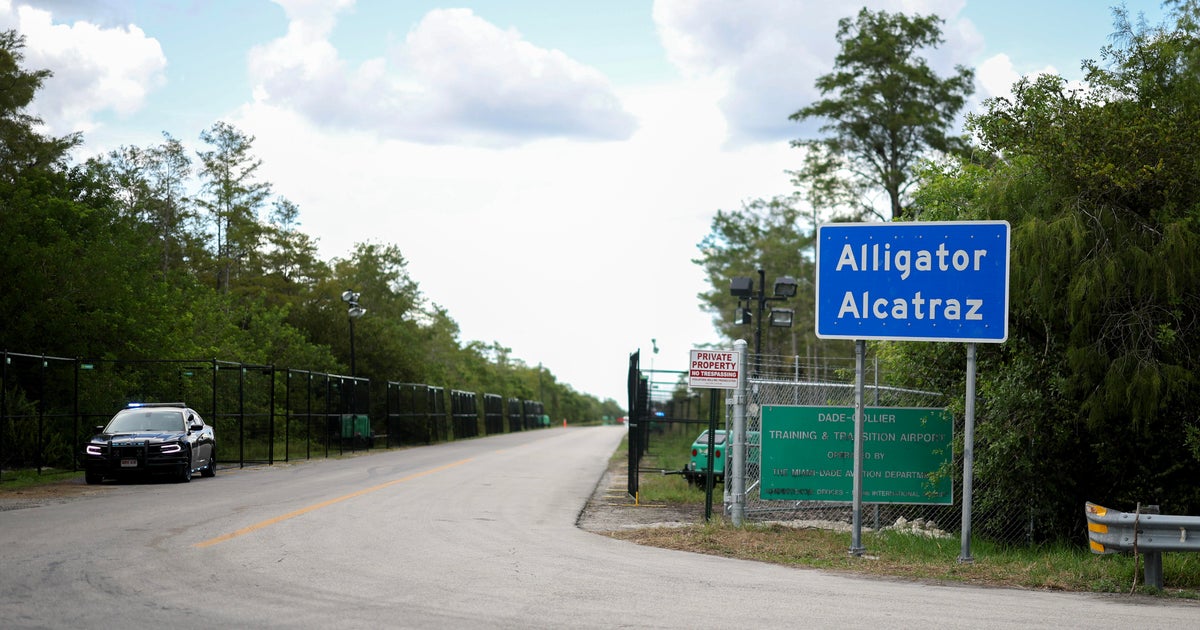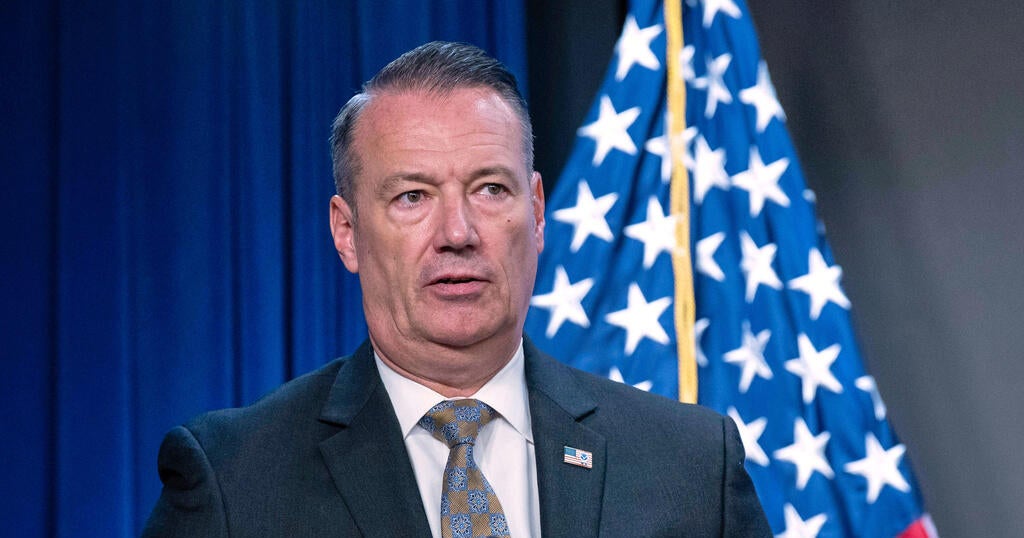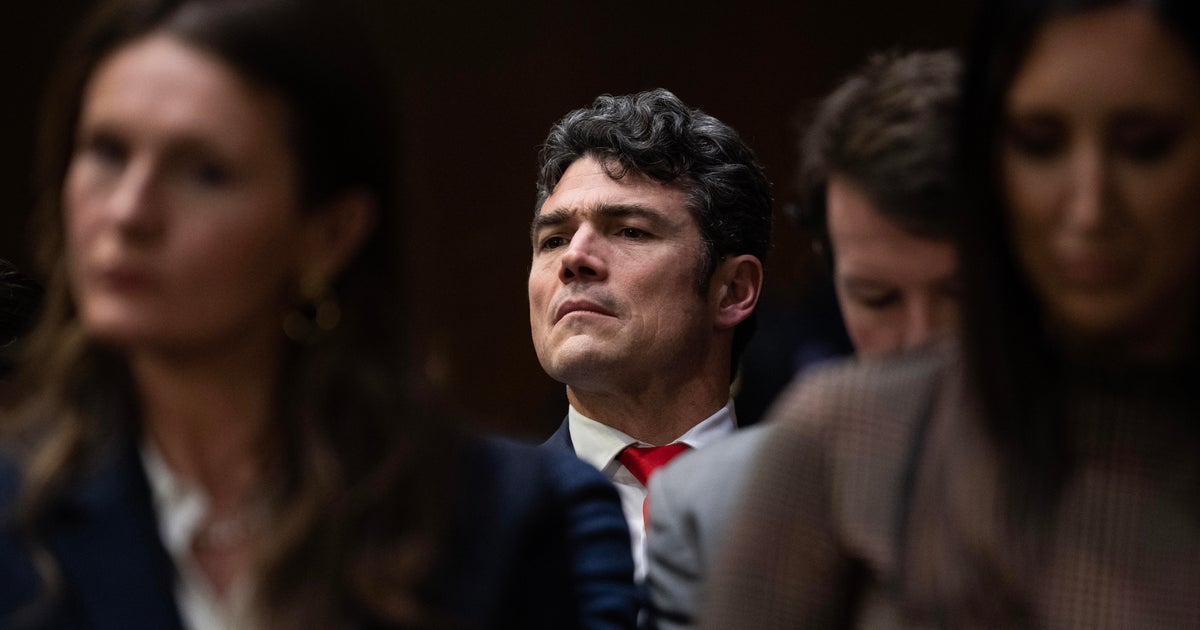Perhaps coming soon to Arizona, Nebraska and Louisiana?
Homeland Security Secretary Kristi Noem says “Alligator Alcatraz” will serve as a model for state-run migrant detention centers, and she told CBS News in an interview that she hopes to launch a handful of similar detention centers in multiple airports and jails across the country, in the coming months. Potential sites are already under consideration in Arizona, Nebraska and Louisiana.
“The locations we’re looking at are right by airport runways that will help give us an efficiency that we’ve never had before,” Noem said, adding that she’s appealed directly to governors and state leaders nationwide to gauge their interest in contributing to the Trump administration’s program to detain and deport more unauthorized migrants.
“Most of them are interested,” Noem said, adding that in states that support President Trump’s mission of securing the southern border, “many of them have facilities that may be empty or underutilized.”
The Department of Homeland Security strategy builds on the opening of a 3,000-bed immigration detention center at a jetport in South Florida last month. Dubbed Alligator Alcatraz by state and federal officials, the makeshift facility will cost an estimated $450 million to operate in its first year. Up and running in just 8 days, the tents and trailers at Dade-Collier Training and Transition Airport are surrounded by 39 square miles of isolated swampland, boasting treacherous terrain and wildlife
Last month, President Trump toured the facility, seeing rows of bunk beds lined up behind chain fences and encircled by razor wire. Mr. Trump joked to reporters there that “we’re going to teach them how to run away from an alligator if they escape prison.” Asked if the temporary facility would be a model of what’s to come, the president said he’d like to see similar operations in “many states.”
The Arizona’s governor’s office told CBS News it has not been approached about a state-run facility.
Nebraska Gov. Jim Pillen’s office said in a statement that his administration “continues to be in communication with federal partners on how Nebraska can best assist in these efforts,” but added that for now, “it is premature to comment” and the governor would “make details public at the appropriate time.”
For her part, Noem called the Alligator Alcatraz model “much better” than the current detention prototype, which largely contracts out its Immigration and Customs Enforcement detention capacity to for-profit prison companies and county jails. ICE is an agency that falls under DHS. This model relies on intergovernmental service agreements (IGSAs) negotiated and signed between ICE and individual localities. She called the Florida facility — with an eventual price tag of $245 per inmate bed, per night, according to DHS officials — a cost-effective option. “Obviously it was much less per-bed cost than what some of the previous contracts under the Department of Homeland Security were.”
According to the Office of Homeland Security Statistics, the estimated average daily cost of detaining an adult migrant in fiscal year 2024 was about $165, though the actual cost of detention typically varies based on region, length of stay and facility type.
Still, Noem argued that the new venues, all with close proximity to airports or runways, will help ICE to cut costs by “facilitating quick turnarounds.”
“They’re all strategically designed to make sure that people are in beds for less days,” Noem said, adding that some of the facilities being considered are still undergoing vetting by the department and subject to ongoing negotiations. “It can be much more efficient once they get their hearings, due process, paperwork.”
Unlike Alligator Alcatraz, which uses funds from a shelter, food and transportation program run by the Federal Emergency Management Agency (FEMA). Noem said the state-based initiative will tap into a new $45 billion funding pool for ICE prompted by President Trump’s “big, beautiful bill”, which was signed into law last month. The pool of money is allocated specifically to the expansion of ICE’s detention network and will nearly double the agency’s bedspace capacity of 61,000 beds, based on cost analysis. As of Saturday, ICE was holding just over 57,000 individuals in its detention network in more than 150 facilities nationwide.
Noem — who has implemented a department-wide policy across DHS of personally approving each and every contract and grant over $100,000 — said keeping ICE detention contracts to a duration of under five years is now “the model we’ve pushed for.” For instance, she added, Alligator Alcatraz is a one-year contract that can be renewed.
“For me personally, the question that I’ve asked of every one of these contracts is, why are we signing 15-year deals?” Noem said. “I have to look at our mission. If we’re still building out and processing 100,000 detention beds 15 years from now, then we didn’t do our job.”
The new policy is a departure from earlier agreements made under the Trump administration. In February, ICE signed a 15-year, $1 billion deal with the GEO Group, a private prison company, to reopen Delaney Hall, a two-story, 1,000-bed facility that ranks among the largest detention centers in the Northeast.
Still, Noem said she doesn’t feel the U.S. is moving away from a private detention model. “I mean, these are competitive contracts,” she said. “I want everybody to be at the table, giving us solutions. I just want them to give us a contract that actually does the job — a contract that doesn’t put more money in their pockets while keeping people in detention beds just for the sake of that contract.”
But Alligator Alcatraz has also come under fire from attorneys claiming that both the Trump and DeSantis administrations are holding detainees without charge or access to immigration courts, violating their constitutional rights. Attorneys argued in a legal filing last month that unauthorized migrants held at the Florida-run site have no legal recourse to challenge their detention.
Lawyers and experts have also called into question the very legality of a state-run immigration detention center, given the federal government’s authority over immigration enforcement. Opening the detention center in the Everglades under Florida’s emergency state powers marked a departure from the federal government’s role of housing migrant detainees, an option typically reserved for those who’ve recently entered the country illegally or those with criminal convictions.
A U.S. district judge last week ordered state and federal officials to provide a copy of the agreement showing “who’s running the show” at the Everglades immigrant-detention center.
“Florida does not have the legal authority to detain undocumented immigrants in the absence of a contract with ICE,” said Kevin Landy, the director of detention policy and planning for ICE under President Barack Obama. “A state government can’t do that.”
Detainees held at Alligator Alcatraz have also claimed unsanitary and inhumane conditions, including food with maggots, denial of religious rights and limited access to both legal assistance and water. Florida officials have denied the accusations.
Still, tucked away in the Florida Everglades 45 miles west of Miami, if its location sounds treacherous, Noem concedes, that’s kind of the point. “There definitely is a message that it sends,” the secretary said. “President Trump wants people to know if you are a violent criminal and you’re in this country illegally, there will be consequences.”
Noem offered that deterrence is an effective strategy based on U.S. gathered intelligence “from three letter agencies, from other intelligence officials throughout the federal government and in a lot of the Latin American and South American countries” that indicates “overwhelmingly, what encourages people to go back home voluntarily is the consequences.”
“They see the laws being enforced in the United States,” Noem said. “They know when they are here illegally and if they are detained, they’ll be removed. They see that they may never get the chance to come back to America. And they’re voluntarily coming home.”
The DHS secretary met with Mexican President Claudia Sheinbaum in March. “One of the questions I asked President Scheinbaum when I was in Mexico is, ‘Do you have any idea how many people may have come back to Mexico that we may not know about,'” Noem said.
“[Sheinbaum] said 500,000 to 600,000 people have come back to Mexico voluntarily since President Trump’s been in office,” Noem continued, explaining that the Mexican president believes her reluctant citizens fear losing the chance to return to the U.S. on a visa or work program.
It’s a datapoint she solicits from many of the foreign leaders she meets with, including Ecuadorian President Daniel Noboa, who shared a 90-minute lunch with the DHS secretary in Quito, last Thursday. “I asked him the same question,” Noem recalled. “He doesn’t have as many illegal immigrants in the United States as in Mexico and Venezuela, but he said he thinks over 100,000 of his citizens have come back to Ecuador. And that’s a huge number.”
Noem reasoned that her Ecuadorian counterpart’s rough estimate is based on two factors — a strengthening Ecuadorian economy and a DHS television campaign launched across Latin and South America, warning prospective migrants not to enter or remain in the U.S. illegally.
“He was very proud of the fact that he’s doing better with his economy. So there’s jobs,” Noem recounted. “But he said, you know, our ads are running in Ecuador. We’re telling people that, if you have family in the United States that are there illegally, it’s time to come home.”

https://www.cbsnews.com/news/alligator-alcatraz-model-kristi-noem-homeland-security


